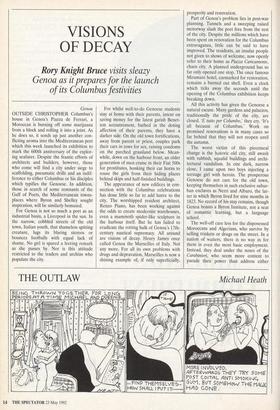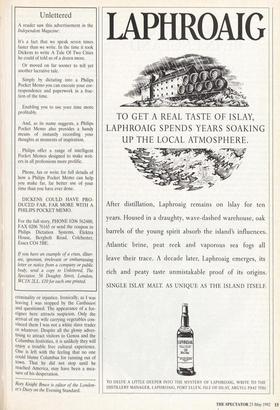VISIONS OF DECAY
Rory Knight Bruce visits sleazy
Genoa as it prepares for the launch of its Columbus festivities
Genoa OUTSIDE CHRISTOPHER Columbus's house in Genoa's Piazza de Ferrari, a Moroccan is burning off some marijuana from a block and rolling it into a joint. As he does so, it sends up just another con- flicting aroma into the Mediterranean port which this week launched its exhibition to mark the 600th anniversary of the explor- ing seafarer. Despite the frantic efforts of architects and builders, however, those who come will find a city under siege to scaffolding, pneumatic drills and an indif- ference to either Columbus or his disciples which typifies the Genoese. In addition, those in search of some remnants of the Gulf of Poets, the Mediterranean towns- places where Byron and Shelley sought inspiration, will be similarly bemused.
For Genoa is not so much a port as an industrial basin, a Liverpool in the sun. In the narrow, cobbled streets of the old town, Italian youth, that shameless spitting creature, lugs its blaring stereos or bounces footballs with equal lack of shame. No girl is spared a leering remark as she passes, by. Nor is this attitude restricted to the traders and urchins who populate the city. For whilst well-to-do Genoese students stay at home with their parents, intent on saving money for the latest garish Benet- ton accoutrement, bathed in the doting affection of their parents, they have a darker side. On the old town fortifications, away from parent or priest, couples park their cars in rows for sex, raining condoms on the parched grassland below. Mean- while, down on the harbour front, an older generation of men cruise in their Fiat 500s for prostitutes, honking their car horns to rouse the girls from their hiding places behind skips and half-finished buildings.
The appearance of new edifices in con- nection with the Columbus celebrations has done little so far to add lustre to the city. The worshipped resident architect, Renzo Piano, has been working against the odds to create modernist warehouses, even a mammoth spider-like sculpture in the harbour itself. But he has failed to eradicate the rotting hulk of Genoa's 17th- century nautical supremacy. All around are visions of decay. Henry James once called Genoa the Marseilles of Italy. Not any more. For all its own problems with drugs and depravation, Marseilles is now a shining example of, if only superficially, prosperity and renovation.
Part of Genoa's problem lies in post-war planning. Tunnels and a sweeping raised motorway slash the port free from the rest of the city. Despite the millions which have been spent on renovation for the Columbus extravaganza, little can be said to have improved. The residents, an insular people not given to shows of welcome, now openly
refer to their home as Piazza Caricamente,
chaos city. A planned underground has so far only opened one stop. The once famous Miramare hotel, earmarked for restoration, remains a burned out shell. Even a clock which ticks away the seconds until the opening of the Columbus exhibition keeps breaking down.
All this activity has given the Genoese a natural excuse. Many gardens and palazzos, traditionally the pride of the city, are
closed. 'E tutto per Columbo,' they cry. 'It's all because of Columbus.' Work on
promised renovations is in many cases so far behind that they will not reopen until the autumn.
The worst victim of this piecemeal change is the historic old city, still awash with rubbish, squalid buildings and archi- tectural vandalism. In one dark, narrow close, I came upon two boys injecting a teenage girl with heroin. The prosperous Genoese do not care for the old town, keeping themselves in such exclusive subur- ban enclaves as Nerri and Albaro, the lat- ter in which Byron lived for nine months in 1823. No record of his stay remains, though Genoa boasts a Byron Institute, not a seat of romantic learning, but a language school.
The well-off care less for the disposessed Moroccans and Algerians, who survive by selling trinkets or drugs on the street. In a nation of waiters, there is no way in for them in even the most basic employment.
Instead, they deal under the noses of the Carabinieri, who seem more content to parade their power than address either
criminality or injustice. Ironically, as I was leaving I was stopped by the Caribinieri and questioned. The appearance of a for- eigner here attracts suspicion. Only the arrival of my wife carrying vegetables con- vinced them I was not a white slave trader or whatever. Despite all the glossy adver- tising to attract visitors to Genoa and the Columbus festivities, it is unlikely they will enjoy a trouble free cultural experience. One is left with the feeling that no one could blame Columbus for running out of town. That he did not stop until he reached America, may have been a mea- sure of his desperation.
Rory Knight Bruce is editor of the London- er's Diary on the Evening Standard.



































































 Previous page
Previous page